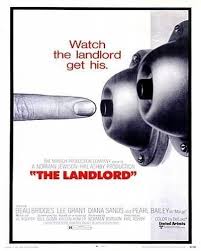
THE LANDLORD
US, 1970, 110 minutes, Colour.
Beau Bridges, Pearl Bailey, Diana Sands, Louis Gossett, Lee Grant.
Directed by Hal Ashby.
The Landlord is quite an unusual comedy. It did not make much of an impression at the box-office when first released. However, critics and those interested in the trends in Hollywood were quite interested in the film during the 70s. One of the main reasons was that it was directed by Hal Ashby. Ashby was a film editor, who had edited such films as In the Heat of the Night and won an Oscar. After The Landlord he went on to make such films as Harold and Maude, Shampoo, The Last Detail, Bound for Glory. The Landlord is interesting when seen in retrospect. It takes a current interest of 1970, race relationships, and presents a satire in a somewhat cynical manner. Beau Bridges is the Landlord of apartments in New York, a rich dilettante young man, suddenly involved in themes of poverty and racism. The film shows how he tries to cope. Lee Grant who was to win an Oscar under Ashby's direction for Shampoo, received a nomination for her role in this film. Probably the best comparison for understanding The Landlord is the type of American satire presented in Shampoo.
1. The overall impact of this film? How interestingly entertaining?
2. The presentation of atmosphere: the world of the rich, the poor, the ghetto, the different homes streets clubs etc.? How necessary for the communication of message?
3. Colour, locations. music the lyrics of the songs?
4. How successful was the style of the film: the realistic aspects the insertion of memories, the insertion of imagination? The interpretation of the realistic flow of the film? The visual aspects of the landlord's consciousness? The success of the editing for the interplay of these styles? The success of the contrasts? The jibe at Guess Who's Coming to Dinner and this film's trying to do the opposite about racism in America?
5. Were the characters realistic and realistically portrayed? How contrived were they for the message? The aspects of farce and cinema cliche and the way these were used to advantage?
6. The creation of the situation of 1970: realism in the United States, the farcical aspects of this, the artificiality of it all?
7. What was the basic message of the film? How well was it communicated? Optimism or pessimism in American race relations?
8. The significance of the opening, Elgar as a character, placed within his white heritage?
9. The focus on real estate as a way of power and money? Elgar and his wealthy background, real estate as a way in? What kind of a liberal was he? In thought, action. compared with his parents and their world? The American dream of white liberal success? was he doomed to failure? His ideas, his personality, his heritage?
10. What kind of person was Elgar? His initial soliloquies to the audience, his later comments? His first appearance and his being frightened by the negroes? His earnestness? What changed him? His wanting to be free of his background at 29? Using his liberal cause as an excuse? His fears, responsibilities?
11. How well portrayed were his family? The American mother and her forcefulness, her nagging, her ideas, emotionalism? The father and his wealth and arrogance, non-communication? Susan., drugs, fiance (The napalm background of the fiance?), William junior and his prim and properness? The family portrayed at dinner, their attitudes to his block of apartments, at the party? The satire on this kind of American family?
12. The contrast with the Negro families? Marge and her background, her changing of Elgar?
13. Copee and his causes and imprisonment, poverty? Copee's wife and her trying to cope, her attraction to Elgar, their lovemaking, the responsibility of the child? Copee's violence? Walter G and his encounter with Elgar?
14. The hostility of Dubois, and the final lesson and Elgar's memories? What was Elgar being taught by this lesson?
15. Lanie, her background, the attraction for Elgar, their relationship? Her changing Elgar? The apartment etc.? The visualising of their love e.g. by the close-up of the hands intertwining etc. (too obtrusive?).
16. The encounter between Joyce and Marge? Did this change Joyce in any way? The possibility of her change of attitude?
17. The importance of the baby for Copee and his being taken away, for his wife and her not wanting the baby, for Elgar's accepting it and asking Lanie? What future did the child have?
18. What lessons did Elgar finally learn? Did he lose interest in Liberal causes? Have a greater sense of realism?
19. was this an adequate portrayal of America in 1970? An effective and comical analysis of the problems and possible solutions? would it change audience attitudes?